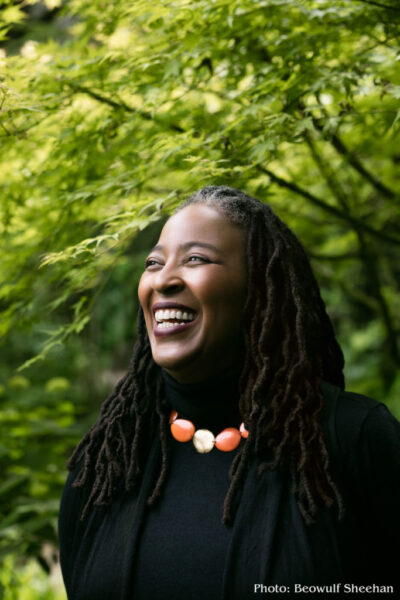“I am a different kind of activist”—Camille Dungy
by Manasseh Awuni

Camille Dungy, a multiple award-winning poet, says she considers herself an activist, but a different kind. Hers is not the traditional boots-on-the-ground activism, she explained during a question-and-answer session at the University of Nebraska-Lincoln (UNL).
Dungy, a University Distinguished Professor at Colorado State University, made these remarks as the guest speaker at UNL’s 2025 National Poetry Month celebration. Before her reading program at the Lied Center for Performing Arts on April 8, Dungy had a session with graduate students in poetry at UNL, where she dispensed her experiences in the craft and trade of the genre.
Responding to a question on whether she, like many writers who focus on the environment, considered herself an activist, Dungy said her activism was geared toward awakening those whose duty it was to act in safeguarding the environment.
“When you start to write about the things you love and care about, you want to be helping other people know that they can also ensure they are loving and caring about those things,” she said. “So, to me, writing activates the spirits of people. How that shows up publicly and politically may differ, depending on who the people are.”
Reading from her different collections, Camille Dungy took her audience of students, faculty, staff, and lovers of poetry through the journey of her life and how the spaces she inhabited helped shape who she was and what she cared for and wrote about. She also answered questions on craft, as well as challenges and opportunities in the publishing world of poets.
Responding to a question about style, she emphasized pushing boundaries in art despite the temptation and expectation on emerging writers to conform to existing rules. One such example was the decision she made early in her career to experiment with her own kind of sonnet, which has become a distinct feature of her poetry.
Dungy is the author of Soil: The Story of a Black Mother’s Garden, which was named book of the month by Hudson’s Booksellers, received the 2024 Award of Excellence in Garden and Nature Writing from The Council on Botanical and Horticultural Libraries, and was on the shortlist for the PEN/Jean Stein Award.
She has also written four collections of poetry, including Trophic Cascade, winner of the Colorado Book Award, and the essay collection Guidebook to Relative Strangers: Journeys into Race, Motherhood, and History, a finalist for the National Book Critics Circle Award.
She edited Black Nature: Four Centuries of African American Nature Poetry, the first anthology to bring African American environmental poetry to national attention.
Dungy’s work has appeared in Best American Poetry, 100 Best African American Poems, Best American Essays, the 1619 Project, All We Can Save: Truth, Courage, and Solutions for the Climate Crisis, over 40 other anthologies, and dozens of venues including The New Yorker, Poetry, and Literary Hub.
Her honors include the Academy of American Poets Fellowship, a Guggenheim Fellowship, an American Book Award, an Honorary Doctorate from SUNY ESF, and fellowships from the NEA in both prose and poetry.